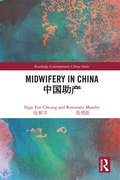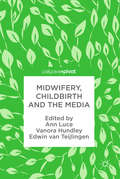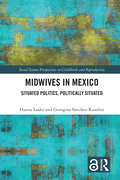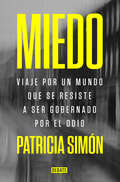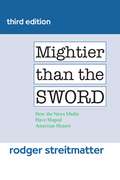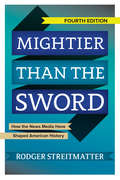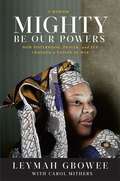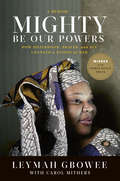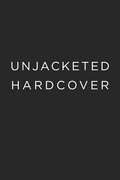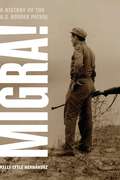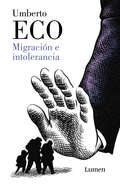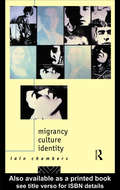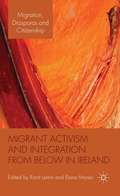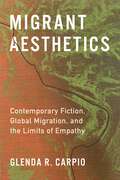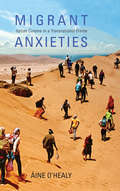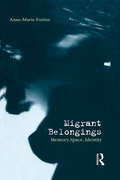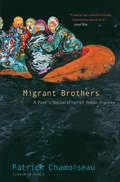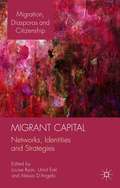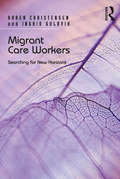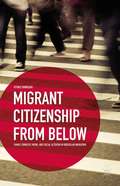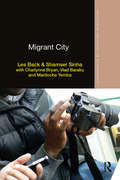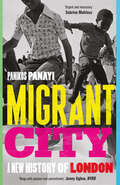- Table View
- List View
Midwifery in China (Routledge Contemporary China Series)
by Rosemary Mander Ngai Fen CheungThe first book to present the history, ideas, life and works of Chinese midwives and birth attendants, this volume seeks to encapsulate and explain the changing ideas about the practice of midwifery in China. Using participant observations and interviews, it examines each phase of the development of midwifery in depth. Providing a systematic study of the existing literature and contemporary national health policies, it analyses the factors contributing to the current demise of midwifery in China, such as the absence of national regulation, high standards of education and national midwives’ associations. Furthermore, it argues that China’s national statistics in the past six decades demonstrate clear evidence that minimising maternal mortality rates will only happen through wider availability of services, rather than through obstetric technology or facility based care. Ultimately, therefore this book supports the view that humanity and midwifery will survive to overcome domination by both technology and market forces and that economic growth and medical technology alone will not be sufficient in providing effective healthcare. This book is an indispensable resource for the study of Chinese midwifery, both in theory and in practice. As such it will be useful to students and scholars of Midwifery, Women’s Health, Sociology and culture and society in China.
Midwifery, Childbirth and the Media
by Ann Luce Vanora Hundley Edwin Van TeijlingenThis edited collection - one of a kind in its field - addresses the theoretical and practical implications facing representations of midwifery and media. Bringing together international scholars and practitioners, this succinct volume offers a cross-disciplinary discussion regarding the role of media in childbirth, midwifery and pregnancy representation. One chapter critiques the provision and dissemination of health information and promotional materials in a suburban antenatal clinic, while others are devoted to specific forms of media - television, the press, social media - looking at how each contribute to women's perceptions and anxieties with regard to childbirth.
Midwives in Mexico: Situated Politics, Politically Situated (Social Science Perspectives on Childbirth and Reproduction)
by Hanna Laako Georgina Sánchez-RamírezThis book presents the contemporary history and dynamics of Mexican midwifery - professional, (post)modern or autonomous, traditional and Indigenous - as profoundly political and embedded in differing societal stratifications. By situated politics, the authors refer to various networks, spaces and territories, which are also constructed by the midwives. By politically situated, the authors refer to various intersections, unsettled relations and contexts in which Mexican midwives are positioned. Examining Mexican midwiferies in depth, the volume sharpens the focus on the worlds in which midwives are profoundly immersed as agents in generating and participating in movements, alliances, health professions, communities, homes, territories and knowledges. The chapters provide a complex panorama of midwives in Mexico with an array of insights into their professional and political autonomy, (post)coloniality, body-territoriality, the challenges of defining midwifery, and above all, into the ways in which contemporary Mexican midwiferies relate to a complex set of human rights. The book will be of interest to a range of scholars from anthropology, sociology, politics, global health, gender studies, development studies, and Latin American studies, as well as to midwives and other professionals involved in childbirth policy and practice.
Midwives in Mexico: Situated Politics, Politically Situated (Social Science Perspectives on Childbirth and Reproduction)
by Hanna Laako Georgina Sánchez-RamírezThis book presents the contemporary history and dynamics of Mexican midwifery - professional, (post)modern or autonomous, traditional and Indigenous - as profoundly political and embedded in differing societal stratifications.By situated politics, the authors refer to various networks, spaces and territories, which are also constructed by the midwives. By politically situated, the authors refer to various intersections, unsettled relations and contexts in which Mexican midwives are positioned. Examining Mexican midwiferies in depth, the volume sharpens the focus on the worlds in which midwives are profoundly immersed as agents in generating and participating in movements, alliances, health professions, communities, homes, territories and knowledges. The chapters provide a complex panorama of midwives in Mexico with an array of insights into their professional and political autonomy, (post)coloniality, body-territoriality, the challenges of defining midwifery, and above all, into the ways in which contemporary Mexican midwiferies relate to a complex set of human rights.The book will be of interest to a range of scholars from anthropology, sociology, politics, global health, gender studies, development studies, and Latin American studies, as well as to midwives and other professionals involved in childbirth policy and practice.The Open Access version of this book, available at http://www.taylorfrancis.com, has been made available under a Creative Commons Attribution-Non Commercial-No Derivatives (CC-BY-NC-ND) 4.0 license.
Miedo: Viaje por un mundo que se resiste a ser gobernado por el odio
by Patricia SimónUn ensayo brillante y necesario que nos invita a ver más allá de nuestros temores. Desde el arranque del siglo XXI, el nivel de incertidumbre que nos hemos visto obligados a manejar en las sociedades occidentales ha aumentado sin cesar. Empeñados en no desfallecer, seguimos pedaleando tan rápido como pudimos, tantas horas al día como el cuerpo nos permitía, con la perenne sensación de que siempre podríamos habernos esforzado un poco más. Pero cuando un virus detuvo el mundo entero, salimos despedidos a la velocidad de la luz hacia un páramo desconocido, a solas con nuestros miedos. Miedo es un libro sobre los temores que han articulado nuestras vidas en los últimos años y que la COVID-19 ha evidenciado y agudizado, acelerando así el cambio de era en el que ya estábamos inmersos: la crisis del neoliberalismo, el cambio climático, la creciente desigualdad, los éxodos de migrantes y refugiados, la robotización del mercado laboral y el aumento del desempleo crónico, el encarecimiento de la vivienda, la crisis demográfica, la polarización y crispación sociales azuzadas por los algoritmos de las grandes empresas tecnológicas, o la privatización de los servicios públicos. La incapacidad de las democracias representativas para dar respuesta a estos desafíos ha terminado por convertirlos en una serie de miedos que los partidos populistas y de extrema derecha han instrumentalizado para imponer su agenda y los discursos de odio. En un ensayo maravillosamente escrito, Patricia Simón recoge, con gran elegancia, sensibilidad y empatía, un conjunto de voces que ejemplifica los principales temores de la sociedad contemporánea, y ofrece un análisis brillante y sensato de las razones que nos están llevando de un mundo regido por la manipulación de la incertidumbre a otro gobernado por la manipulación de los miedos.
Mightier than the Sword
by Rodger StreitmatterIn this path-breaking book, Rodger Streitmatter takes readers on a sightseeing tour of American history as influenced by the public press, visiting sixteen landmark events in US history, from the American Revolution and the civil rights movement to Watergate and 9/11. These are events that stir the political imagination; but, as Streitmatter shows, they also demonstrate how American journalism, since the 1760s, has not merely recorded this nation's history but has played a role in shaping it. This book is the first of its kind. Streitmatter avoids the mind-numbing lists of names, dates, and newspaper headlines that bog down the standard journalism history textbook. Instead, he focuses on a limited number of episodes, identifying common characteristics within the news media. The third edition includes an entirely new chapter on social media and the election of Barack Obama. This edition also looks beyond traditional journalistic outlets such as newspapers and television news reports to examine the modern-day role that the Internet and its various venues play in reporting the news and shaping history.
Mightier than the Sword
by Rodger StreitmatterIn this text for an undergraduate course in history and/or journalism, Streitmatter (journalism, American University) examines 16 major milestones in US history which shed light on how events have been influenced by the news media, from the Revolutionary War era to the present, in areas such as women's rights, civil rights, and public opinion on war. There is also discussion of Watergate, Rush Limbaugh, and the media's response to the terrorist attacks on 9/11. While several chapters focus on examples of the negative impact of the media, most describe its positive impact. This third edition contains a new chapter on Obama's election and offers new material on social media and Internet news outlets. The book includes b&w historical illustrations and photos. It is accessible to general readers as well as students. Annotation ©2012 Book News, Inc. , Portland, OR (booknews. com)
Mightier than the Sword
by Rodger StreitmatterIn this path-breaking book, Rodger Streitmatter takes readers on a sightseeing tour of American history as influenced by the public press, visiting sixteen landmark events in US history, from the American Revolution and the civil rights movement to Watergate and 9/11. These are events that stir the political imagination; but, as Streitmatter shows, they also demonstrate how American journalism, since the 1760s, has not merely recorded this nation’s history but has played a role in shaping it. This book is the first of its kind. Streitmatter avoids the mind-numbing lists of names, dates, and newspaper headlines that bog down the standard journalism history textbook. Instead, he focuses on a limited number of episodes, identifying common characteristics within the news media. The third edition includes an entirely new chapter on social media and the election of Barack Obama. This edition also looks beyond traditional journalistic outlets such as newspapers and television news reports to examine the modern-day role that the Internet and its various venues play in reporting the news and shaping history.
Mightier than the Sword
by Rodger StreitmatterIn this engaging examination of the media’s influence on US history and politics, Rodger Streitmatter visits sixteen landmark episodes, from the American Revolution to the present-day fight for gay and lesbian marriage equality. In each of these cases, Streitmatter succinctly illustrates the enormous role that journalism has played in not merely recording this nation’s history but also in actively shaping it. Mightier than the Sword offers students and professors a highly readable and accessible alternative to journalism history textbooks. Instead of trying to document every detail in the development of US media through dry, dull lists of names, dates, and headlines, this book focuses on sixteen discrete episodes that illustrate a point that is much larger than the sum of their parts: media have played and continue to play an enormous role in shaping this nation. The fourth edition features an entirely new chapter on the way US media have championed various gay and lesbian rights initiatives, from the 2003 Lawrence vs. Texas sodomy case through the June 2013 Supreme Court decision striking down DOMA (the Defense of Marriage Act). Balancing criticism and celebration of news media and exploring both print and electronic platforms, Mightier than the Sword provides students with a sense of the power and responsibility inherent in the institution of journalism.
Mighty Be Our Powers: How Sisterhood, Prayer, and Sex Changed a Nation at War
by Leymah Gbowee Carol L. MithersWINNER OF THE 2011 NOBEL PEACE PRIZE. In a time of death and terror, Leymah Gbowee brought Liberia's women together--and together they led a nation to peace. As a young woman, Leymah Gbowee was broken by the Liberian civil war, a brutal conflict that tore apart her life and claimed the lives of countless relatives and friends. Years of fighting destroyed her country--and shattered Gbowee's girlhood hopes and dreams. As a young mother trapped in a nightmare of domestic abuse, she found the courage to turn her bitterness into action, propelled by her realization that it is women who suffer most during conflicts--and that the power ofwomen working together can create an unstoppable force. In 2003, the passionate and charismatic Gbowee helped organize and then led the Liberian Mass Action for Peace, a coalition of Christian and Muslim women who sat in public protest, confronting Liberia's ruthless president and rebel warlords, and even held a sex strike. With an army of women, Gbowee helped lead her nation to peace--in the process emerging as an international leader who changed history. Mighty Be Our Powers is the gripping chronicle of a journey from hopelessness to empowerment that will touch all who dream of a better world.
Mighty Be Our Powers: How Sisterhood, Prayer, and Sex Changed a Nation at War
by Leymah Gbowee Carol Mithers"WINNERaOFaTHEa2011 NOBELaPEACEaPRIZE""I""n a time of death and terror, Leymah Gbowee brought LiberiaOCOs women togetherOCoand together they led a nation to peace. "As a young woman, Leymah Gbowee was broken by the Liberian civil war, a brutal conflict that tore apart her life and claimed the lives of countless relatives and friends. Years of fighting destroyed her countryOCoand shattered GboweeOCOs girlhood hopes and dreams. As a young mother trapped in a nightmare of domestic abuse, she found the courage to turn her bitterness into action, propelled by her realization that it is women who suffer most during conflictsOCoand that the power of women working together can create an unstoppable force. In 2003, the passionate and charismatic Gbowee helped organize and then led the Liberian Mass Action for Peace, a coalition of Christian and Muslim women who sat in public protest, confronting LiberiaOCOs ruthless president and rebel warlords, and even held a sex strike. With an army of women, Gbowee helped lead her nation to peaceOCoin the process emerging as an international leader who changed history. "Mighty Be Our Powers" is the gripping chronicle of a journey from hopelessness to empowerment that will touch all who dream of a better world. a"
Migra! A History of the U. S. Border Patrol
by Kelly Lytle HernandezThis is the untold history of the United States Border Patrol from its beginnings in 1924 as a small peripheral outfit to its emergence as a large professional police force. To tell this story, Kelly Lytle dug through a gold mine of lost and unseen records stored in garages, closets, an abandoned factory, and in U.S. and Mexican archives.
Migra!: A History of the U.S. Border Patrol (American Crossroads #29)
by Kelly Lytle HernandezPolitical awareness of the tensions in U.S.-Mexico relations is rising in the twenty-first century; the American history of its treatment of illegal immigrants represents a massive failure of the promises of the American dream. This is the untold history of the United States Border Patrol from its beginnings in 1924 as a small peripheral outfit to its emergence as a large professional police force that continuously draws intense scrutiny and denunciations from political activism groups. To tell this story, MacArthur "Genius" Fellow Kelly Lytle Hernández dug through a gold mine of lost and unseen records and bits of biography stored in garages, closets, an abandoned factory, and in U.S. and Mexican archives. Focusing on the daily challenges of policing the Mexican border and bringing to light unexpected partners and forgotten dynamics, Migra! reveals how the U.S. Border Patrol translated the mandate for comprehensive migration control into a project of policing immigrants and undocumented "aliens" in the U.S.-Mexico borderlands.
Migración e intolerancia
by Umberto EcoUmberto Eco inédito y urgente. «La figura de Umberto Eco es tanto mayor cuanto más tiempo pasa.»Vicente Verdú, El País Eliminar el racismo no signifi ca convencerse de que los otros no son diferentes de nosotros, sino comprender y aceptar su diferencia. Esta colección de charlas -definidas por el propio Eco como un collage sobre las bases del racismo y de la intolerancia- evidencia el abismo que dista entre actuar con la cabeza y actuar con las vísceras. Una guía concisa, visionaria y única por su claridad y autoridad, rabiosamente actual en este momento tan delicado en el que la incomprensión y lo retrógrado parecen imponerse. Un manual imprescindible para mirar al otro con nuevos ojos y entender el panorama político y social, por «el escritor que cambió la cultura» (Corriere della Sera). La crítica ha dicho...«Un libro pequeñito y agudo que por momentos resulta hiriente, irónico como es habitual en el autor, necesario para aprender a aceptar todas las diferencias que habitan hoy en día.»José Miguel Segura, El Periódico Mediterráneo «Un genio inagotable, voraz, que construye y deconstruye sin cesar, de inteligencia deslumbrante y humorística cuando hace falta.»Mercedes Monmany, ABC «Uno de los pensadores más influyentes de nuestro tiempo.»Los Angeles Times «Umberto Eco era un hombre libre, dotado de un profundo espíritu crítico y de una gran pasión cívica. [...] Su autobiografía refleja la búsqueda de la identidad cultural de generaciones enteras de la posguerra. Observador agudo y desencantado, sus novelas y ensayos han aportado prestigio a Italia y ha enriquecido la cultura en todas sus latitudes.»Sergio Mattarella, presidente de la República de Italia «Una de las mentes más brillantes de Italia.»Library Journal «Umberto Eco es un cultísimo ensayista que trabaja desde una ciencia tan plural como la semiótica, y un novelista que de algún modo plantea en cada título lo que pudiéramos decir una "novela-ensayo".»Luis Antonio de Villena «Un sabio que sabía todas las cosas simulando que las ignoraba para seguir estudiando.»Juan Cruz, El País «La figura de Umberto Eco es tanto mayor cuanto más tiempo pasa.»Vicente Verdú, El País «La literatura de Umberto Eco es un bombardeo indiscriminado que no respeta ningún protocolo de guerra.»El Cultural «Umberto Eco disecciona el mal.»La Razón «Un humanista integral.»Fernando Savater
Migrancy, Culture, Identity (Comedia)
by Iain ChambersIn Migrancy, Culture, Identity, Iain Chambers unravels how our sense of place and identity is realised as we move through myriad languages, worlds and histories. The author explores the uncharted impact of cultural diversity on today's world, from the 'realistic' eye of the painter to the 'scientific' approach of the cultural anthropologist or the critical distance of the historian; from the computer screen to the Walkman and 'World Music'. Migrancy, Culture and Identity takes us on a journey into the disturbance and dislocation of culture and identity that faces all of us to explore how migration, marginality and homelessness have disrupted the West's faith in linear progress and rational thinking, undermining our knowledge, history and cultural identity.
Migrant Activism and Integration from Below in Ireland
by Ronit Lentin Elena MoreoThis book analyzes the interaction between migrant activists and leaders and the state of the Republic of Ireland - a late player in Europe's immigration regime - against the background of an increasingly restrictive immigration regime.
Migrant Aesthetics: Contemporary Fiction, Global Migration, and the Limits of Empathy (Literature Now)
by Glenda R. CarpioBy most accounts, immigrant literature deals primarily with how immigrants struggle to adapt to their adopted countries. Its readers have come to expect stories of identity formation, of how immigrants create ethnic communities and maintain ties to countries of origin. Yet such narratives can center exceptional stories of individual success or obscure the political forces that uproot millions of people the world over.Glenda R. Carpio argues that we need a new paradigm for migrant fiction. Migrant Aesthetics shows how contemporary authors—Teju Cole, Dinaw Mengestu, Aleksandar Hemon, Valeria Luiselli, Julie Otsuka, and Junot Díaz—expose the historical legacies and political injustices that produce forced migration through artistic innovation. Their fiction rejects the generic features of immigrant literature—especially the acculturation plot and the use of migrant narrators as cultural guides who must appeal to readerly empathy. They emphasize the limits of empathy, insisting instead that readers recognize their own roles in the realities of migration, which, like climate change, is driven by global inequalities. Carpio traces how these authors create literary echoes of the past, showing how the history of (neo)colonialism links distinct immigrant experiences and can lay the foundation for cross-ethnic migrant solidarity. Revealing how migration shapes and is shaped by language and narrative, Migrant Aesthetics casts fiction as vital testimony to past and present colonial, imperial, and structural displacement and violence.
Migrant Anxieties: Italian Cinema in a Transnational Frame (New Directions in National Cinemas)
by Áine O'HealyDuring a period of heightened global concerns about the movement of immigrants and refugees across borders, Migrant Anxieties explores how filmmakers in Italy have probed the tensions accompanying the country’s shift from an emigrant nation to a destination point for over five million immigrants over the course of three decades. Áine O’Healy traces a phenomenology of anxiety that is not only present at the sociopolitical level but also interwoven into the narrative strategies of over 30 films produced since 1990, throwing into sharp relief the interface between the local and the global in this transnational era. Starting with the representation of post-communist migrations to Italy from Eastern Europe and subsequent arrivals from Africa through the controversial frontier of Lampedusa, O’Healy explores topics as diverse as the configuration of migrant labor, affective surrogacy, Italian whiteness, and the legacy of Italy’s colonial history. Showing how contemporary filmmaking practices in Italy are linked to changes in the broader media landscape, O’Healy analyzes the ways in which both Italian and migrant filmmakers are reimagining Italian society and remapping the nation’s borderscape.
Migrant Belongings: Memory, Space, Identity
by Anne-Marie FortierThis book traces the formation of Italian migrant belongings in Britain, and scrutinizes the identity narratives through which they are stabilized. A key theme of this study is the constitution of identity through both movement and attachment. The study follows the Italian identity project since 1975, when community leaders first raised concerns about 'the future of invisible immigrants'. The author uses the image of 'invisible immigrants' as the starting point of her inquiry, for it captures the ambivalent position Italians occupy within the British political and social landscape. As a cultural minority absorbed within the white European majority, their project is steeped in the ideal of visibility that relies on various 'displays of presence'. Drawing on a wide range of material, from historical narratives, to political debates, processions, religious rituals, activities of the Women's Club, war remembrances, card games, and beauty contests, the author explores the notion of migrant belongings in relation to performative acts that produce what they claim to be reproducing. She reveals how these acts work upon the historical and cultural environment to re-member localized terrains of migrant belongings, while they simultaneously manufacture gendered, generational and ethnicized subjects. Located at the crossroads of cultural studies, 'diaspora' studies, and feminist/queer theory, this book is distinctive in connecting an empirical study with wider theoretical debates on identity. Nominated for the Philip Abrams Memorial Book Prize 2001.
Migrant Brothers: A Poet's Declaration of Human Dignity
by Patrick Chamoiseau Matthew Amos Fredrik Rönnbäck“If justice had a Jericho trumpet, Chamoiseau would be it.”—Junot Díaz <P><P>As migrants embark on perilous journeys across oceans and deserts in pursuit of sanctuary and improved living conditions, what is the responsibility of those safely ensconced in the nations they seek to enter? <P>Moved by repeated tragedies among immigrants attempting to enter eastern and southern Europe, Patrick Chamoiseau assails the hypocrisy and detachment that allow these events to happen. Migrant Brothers is an urgent declaration of our essential interconnectedness that asserts the necessity to understand one another as part of one human community, regardless of national origin.
Migrant Capital
by Louise Ryan Umut Erel Alessio D�angeloMigrant Capital covers a broad range of case studies and, by bringing together leading and emerging researchers, presents state-of-the-art empirical, theoretical and methodological perspectives on migration, networks, social and cultural capital, exploring the ways in which these bodies of literature can inform and strengthen each other.
Migrant Care Workers: Searching for New Horizons
by Karen Christensen Ingrid GuldvikIn this beautifully-argued book, Karen Cristensen and Ingrid Guldvik provide a comparatively-based insight to the historical context for public care work and show how migration policies, general welfare and long-term care policies (including the cash-for-care schemes) as well as cultural differences in values in the UK and Norway set the context for how migrant care workers can realise their individual life projects. Through viewing migrants as individuals who actively construct their lives within the options and conditions they are given at any time, they bring to the discussion an awareness of what might be called ’a new type of migrant’ one who is neither a victim of the divide between the global north and the global south, nor someone leaving family behind, but individuals using care work as a part of their own life project of potential self-improvement.
Migrant Citizenship from Below
by Kyoko ShinozakiMigrant Citizenship from Below explores the dynamic local and transnational lives of Filipina and Filipino migrant domestic workers living in Sch#65533;nberg, Germany. Shinozaki examines their irregular migrant citizenship status from 'above', which is produced by complex interactions between Germany's welfare, care, and migration regimes and the Philippines' gendered politics of overseas employment. Despite the predominant representation of these workers as invisible, these spatially immobile migrants maintain sustained transnational engagements through parenting and religious practices. Shinozaki studies the reverse-gendered process of international reproductive labor migration, in which women traveled first and were later joined by men. Despite their structural vulnerability, participant observations and biographical interviews with the migrants demonstrate that they enact and negotiate migrant citizenship in the workplace, transnational households, religious practices and through accessing health provisions.
Migrant City (Routledge Advances in Ethnography)
by Les Back Shamser SinhaMigrant City tells the story of contemporary London from the perspective of thirty adult migrants and two sociologists. Connecting migrants’ private struggles to the public issues at stake in the way mobility is regulated, channelled and managed in a globalised world, this volume explores what migration means in a world that is hyper connected – but where we see increasingly mobile, invasive and technologically sophisticated forms of border regulation and control. Migrant City is an innovative collaborative ethnography based on research with migrants from a wide variety of social backgrounds, spanning in some cases a decade. It utilises recollections, photographs, poems, paintings, journals and drawings to explore a wide range of issues. These range from the impact of immigration control and surveillance on everyday life, to the experience of waiting for the Home Office to process their claims and the limits this places on their lives, to the friendships and relationships with neighbours that help to make London a home. This title will appeal to students, scholars, community workers and general readers interested in migration, race and ethnicity, social exclusion, globalisation, urban sociology, and inventive social research methods.
Migrant City: A New History of London
by Panikos PanayiThe first history of London to show how immigrants have built, shaped and made a great success of the capital cityLondon is now a global financial and multicultural hub in which over three hundred languages are spoken. But the history of London has always been a history of immigration.Panikos Panayi explores the rich and vibrant story of London– from its founding two millennia ago by Roman invaders, to Jewish and German immigrants in the Victorian period, to the Windrush generation invited from Caribbean countries in the twentieth century. Panayi shows how migration has been fundamental to London&’s economic, social, political and cultural development.Migrant City sheds light on the various ways in which newcomers have shaped London life, acting as cheap labour, contributing to the success of its financial sector, its curry houses, and its football clubs. London&’s economy has long been driven by migrants, from earlier continental financiers and more recent European Union citizens. Without immigration, fueled by globalization, Panayi argues, London would not have become the world city it is today.
